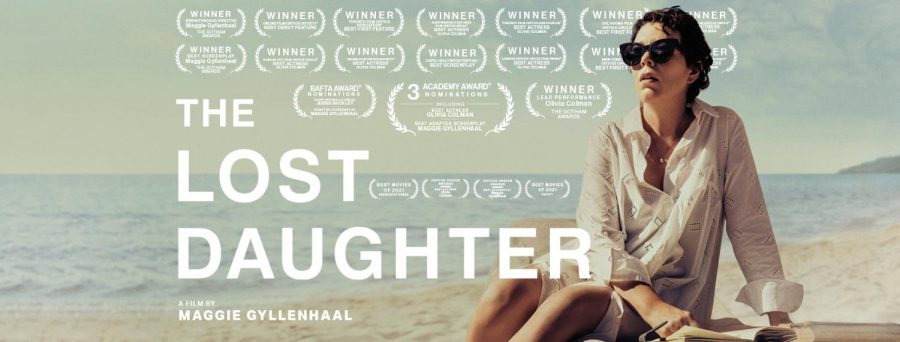For protagonist Leda Caruso, a nice, quiet vacation on the beaches of the Mediterranean was her sole desire. Portrayed by Olivia Colman in the 2021 film, “The Lost Daughter,” Leda is a soft-spoken woman. Not one for lengthy conversations; she itches and squirms uncomfortably, desperately waiting for every interaction she encounters to end. She arrives at a small villa with nothing but a suitcase and a few books, looking for company in the quiet comfort of the island. However, things turn strange very quickly, and Leda finds herself in the middle of it all. Is she causing the strangeness, or is it everyone around her that’s strange? Why does she react to everything so deeply? Why is she so emotional? Why is Leda the way she is? “The Lost Daughter,” a fantastic directorial debut from Maggie Gyllenhaal, is a story of motherhood, love and guilt. Adapted from Elena Ferrante’s 2006 novel of the same name, the film follows Leda, a professor, translator and mother of two throughout her Mediterranean vacation that induces more stress than solace.
Throughout the entire film, Leda is haunted by her past. We, as the audience, are left to piece the puzzle together as much goes unexplained for most of the film’s runtime. Gyllenhaal’s refusal to let us into Leda’s life is one of the most stellar aspects of this film; Leda is an extremely private person, so why shouldn’t her story be told in that same private way?
Olivia Colman, in one of her best performances of the year, is a distraught and worried woman. It’s written all over her face, from her sorrowful eyes to her cautious mannerisms. She’s plagued by her past constantly, reminiscing about her children and their lack of a mother figure. Younger Leda, portrayed beautifully (and incredibly believably) by Jessie Buckley, is a frazzled and spent woman. Buckley’s representation of Leda’s younger self is a standout performance from the relatively fresh-faced actress. A spent and frazzled woman, she balances her motherly duties and her career unsuccessfully. She’s either too distant or too involved with her family; she loves her husband and kids one day, despises them the next. Young Leda clearly desires so much more out of life than she possesses. After a famous scholar pays her just the right amount of attention, Leda realizes she’s not meant for motherhood.
This feeling of inadequacy as a mother is exactly what draws her to Nina, a young mother she encounters on her less-than-idyllic vacation. Part of a large Greek family that Leda doesn’t seem so happy to meet, Nina, portrayed by Dakota Johnson, is disconnected from them all. She’s seen devoting all her time to her daughter Elena, yet there is something strange about her; she seems too quiet and too removed. After conversing with her time and again, Leda recognizes Nina for who she is – the same frazzled and spent woman young Leda once was. Nina confides in Leda, and Leda accepts this honesty with open arms. She makes Leda feel trustworthy, someone she can talk to with no reservations. Nina makes Leda feel like a mother, a feeling she never attained from her own daughters. Nina curbs all of Leda’s fears for the time being, and all is well. However, Leda has a secret.
At the beginning of the film, Leda steals a doll she finds on the beach. While this doesn’t seem to be a red flag in any way, viewers come to find that the doll belongs to Elena, Nina’s daughter. Leda cherishes this doll as it reminds her of one she had as a child, and she stows it away for much of the film. They continue searching high and low for Elena’s doll, even offering a reward. Leda watches this unravel, and while she knows it was wrong to steal it, she can’t bear to return it. She cleans the doll, watches it with a keen eye and hides it whenever she leaves her villa. It’s a gentle reminder of the person she was before having her two daughters; a reminder that she too, was once an unassuming and naive child. Furthermore, it reminds Leda that no matter how distant of a mother she was, her daughters were too innocent and too young to remember much of it.
Leda’s past as a lackluster mother is what’s haunted her for years, and continues to haunt her. Through all the flashbacks spliced into the film (effortlessly, might I add), viewers are able to tell that Leda was never meant to be a young mother. Younger Leda’s soft face and gentle air is more reminiscent of a child than a mother, and Buckley’s portrayal of this character only solidifies this assumption. Her facial expressions are sharp, and viewers understand that at her core, younger Leda is tired and frustrated. She didn’t ask for daughters, and she most definitely didn’t ask for this immense responsibility. This feeling of inadequacy, no matter how short-lived, is something Leda will never be able to escape. Gyllenhaal’s film, however, is not a story of regret. Leda never once mentions how guilty she feels, even though it’s relatively telling. She simply welcomes every memory of her past – pleasant or unpleasant – and basks in her emotions. She realizes that her treatment of her daughters was more than unfair, yet she doesn’t truly blame herself. Deep down, she’s a very caring person; she offers her apartment to Nina, she apologizes to Callie after a horrendous first impression and she’s even reached out to make amends with her daughters.
As a director, Gyllenhaal makes one thing clear, this film isn’t supposed to be relatable. She focuses on the nitty-gritty, the actions that make Leda, Nina and every other character in this film seem flawed. It’s not a movie that’s supposed to comfort, but rather, it’s one that’s supposed to show us the terrible things we as humans are capable of. It’s a movie for grown-ups and by grown-ups, never beating around the bush and simply existing to show us the worst parts of ourselves. It exists as a mirror and forces us as viewers to be content with our reflection.
Ashviny Kaur can be reached at [email protected].



















